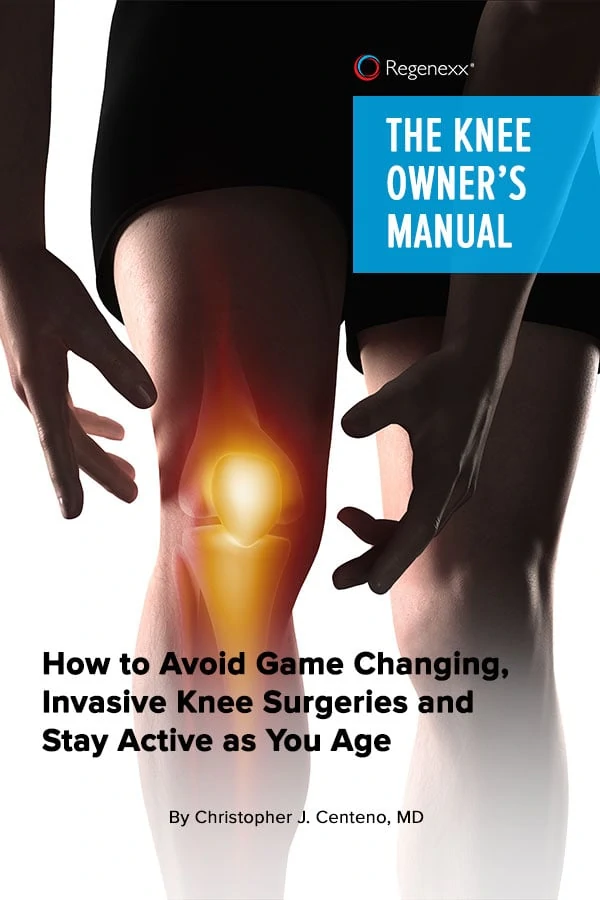Orthopedic surgeons perform about 700,000 knee meniscus surgeries every year in the United States, making it the most-performed knee procedure in the country. So you’d think there must be an abundance of research showing this procedure works. Unfortunately, this is not the case; in fact, study after study has shown meniscus surgery to be ineffective and, in many cases, no better than a sham procedure. Now, we’re seeing more and more evidence that not only is the surgery almost always unnecessary, but that meniscus surgery may cause or, at a minimum, facilitate knee arthritis. Let’s review a case in point.
Want to Get Back to What You Love, Without Surgery and Medication?
Case Study Review: A Case of Meniscus Surgery Knee Arthritis
A few months ago, Dr. Schultz shared a case study revealing the consequences of a prior meniscus surgery on one of his new patients. By the time the patient made her way to Dr. Schultz, she was three years post meniscus surgery (two, in fact, the same year) and was not only experiencing significant knee pain that was worsening but was also unresponsive to physical therapy and other treatments. On comparison of her MRI images before both surgeries and three years after, the patient had experienced progressive cartilage loss and swelling as well as volume loss in the meniscus.

In just three short years, the patient was now suffering from a significant progression of knee arthritis. And, unfortunately, we see many patients who have had a couple of meniscus surgeries and are seeking other options because they’re now being advised they need to have their knee replaced.
The Meniscus and Meniscus Surgery
The meniscus is a protective cushion of tissue that lives in the knee joint. It’s job is to absorb shock and shield the knee cartilage. While the meniscus can become torn due to an injury, such as while playing sports, by far, the most common meniscus tears occur due to normal wear and tear. The fact is, by the time we reach middle age, we all have them, just like we all have gray hair. Likewise, repairing a wear-and-tear meniscus tear in middle age is no more necessary than covering up those grays.
The concept of meniscus repair is misleading, as surgeons access the knee either through an arthroscope or an open incision and excise, or cut out, pieces of the meniscus rather than sew the tear back together. Since the meniscus is there to protect the cartilage, it’s understandable that removing chunks of it can create not only instabilities but leave the cartilage more vulnerable to injury that may later result in arthritis.
We’ve seen evidence for a number of years linking meniscus surgery to the later development of arthritis, and now a new study supports this further.
Meniscus Surgery May Result in Knee Arthritis
In the recent study, almost 63% of patients who underwent meniscus surgery later developed (within eight years) knee arthritis in the surgical knee. While you might be left to wonder if these patients might have developed knee arthritis anyway, without the surgery, the study took this a step further. The researchers compared the meniscus surgery knee to the opposite knee (nonsurgical knee) and found that only 28% of the same patients developed arthritis in the nonsurgical knee. Even further, of those who had wear-and-tear meniscus tears (meaning not due to injury), only 10% had knee arthritis before surgery; compare this to the knee arthritis findings in the same population in the years after surgery—a whopping almost 67% now had knee arthritis.
In addition, it’s important to note that prior studies have also shown that while your MRI may show a knee meniscus tear and you have knee pain, this doesn’t mean the tear is causing the pain. In fact, it’s very likely your back is causing your knee pain (read more at this link).
Just because it’s the most popular knee procedure on the block doesn’t mean it’s one you want to be associated with, especially if your meniscus tear is just an incidental wear-and-tear finding seen on an MRI and you’re middle aged. It’s only a matter of time before meniscus surgery is retired and relegated to the medical history books. Until then, if you have a meniscus tear, don’t risk complications, ongoing pain, and meniscus surgery knee arthritis—see an interventional orthopedic physician, who can determine and usually treat the true source of your pain nonsurgically.

